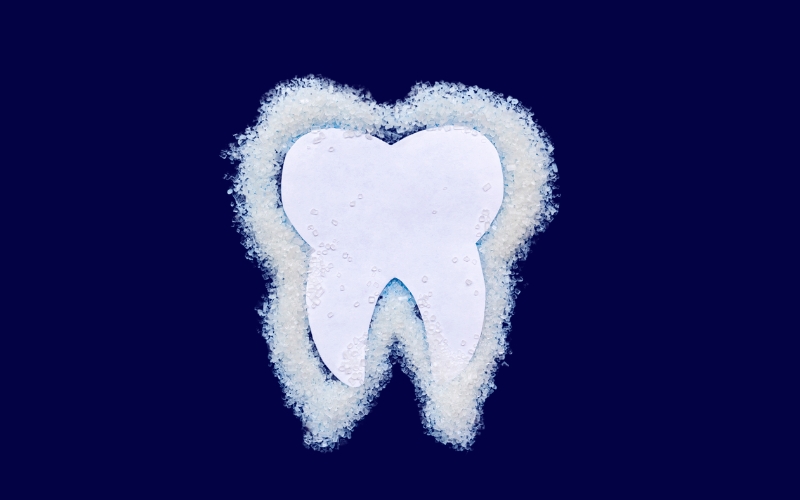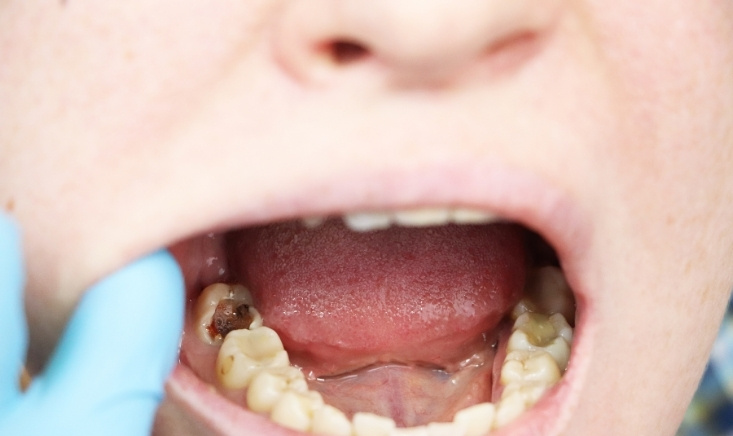2200 AW Grimes Blvd, Suite 100 Round Rock, TX 78665
Can Sugar Permanently Damage Teeth?

Sugar is everywhere in our diets, from obvious sources like candy and soda to hidden ones like sauces and bread. It delights our taste buds but can be a nightmare for our teeth. So, can sugar really cause permanent damage to your teeth? Unfortunately, the answer is yes. In this blog post, we’ll break down how sugar harms your oral health, leading to issues like cavities and gum disease.
The Science Behind Sugar and Tooth Decay
Understanding how sugar affects your teeth requires a bit of knowledge about the oral ecosystem. Your mouth is home to billions of bacteria, some beneficial and others harmful. The harmful bacteria feed on sugars and produce acids as a byproduct. These acids attack the enamel, the hard outer layer of your teeth, leading to demineralization and, eventually, cavities.
The Role of Plaque
Plaque is a sticky film of bacteria that forms on your teeth. When you consume sugary foods and drinks, the bacteria in plaque produce acids that can erode your enamel. If not removed through regular brushing and flossing, plaque can harden into tartar, which is more difficult to remove and can lead to gum disease.
How Sugar Contributes to Gum Disease
Gum disease, or periodontal disease, is a serious condition that affects the tissues surrounding your teeth. It starts with gingivitis, an inflammation of the gums caused by plaque buildup. If left untreated, it can progress to periodontitis, a more severe form of gum disease that can lead to tooth loss. The connection between sugar and gum disease lies in the plaque that forms when bacteria feed on sugars. As plaque accumulates, it irritates the gums, leading to inflammation and infection.
The Long-term Effects of Sugar on Oral Health
The damage sugar causes to your teeth can be long-lasting and sometimes permanent. Cavities, for instance, can only be treated by dental procedures such as fillings, crowns, or, in severe cases, extractions. Gum disease can lead to the destruction of the bone supporting your teeth, which is irreversible. Additionally, chronic exposure to high sugar levels can increase the risk of developing other health issues such as diabetes and heart disease, which can further complicate oral health.
Practical Tips to Protect Your Teeth from Sugar Damage
Protecting your teeth from the damaging effects of sugar involves a combination of good oral hygiene practices, dietary choices, and regular dental visits. Here are some practical tips you can implement in your daily life:
1. Maintain a Rigorous Oral Hygiene Routine
- Brush Twice a Day: Use fluoride toothpaste to strengthen your enamel and brush for at least two minutes.
- Floss Daily: Flossing removes plaque and food particles from between your teeth and under the gumline.
- Use Mouthwash: Antimicrobial mouthwash can help reduce bacteria that cause plaque and gum disease.
2. Make Smart Dietary Choices
- Limit Sugary Snacks and Beverages: Opt for healthier snacks like fruits, vegetables, and nuts.
- Read Labels: Be aware of hidden sugars in processed foods. Ingredients like high fructose corn syrup, sucrose, and dextrose are all forms of sugar.
- Stay Hydrated: Drinking water, especially fluoridated water, can help wash away sugars and acids from your teeth.
3. Regular Dental Visits
- Schedule Routine Check-ups: Visit your dentist in Round Rock, at least twice a year for professional cleanings and check-ups.
- Professional Cleanings: Regular cleanings can remove tartar buildup and detect early signs of tooth decay or gum disease.
The Importance of Fluoride
Fluoride is a mineral that can help prevent tooth decay by making your enamel more resistant to acid attacks. It can be found in various sources, including toothpaste, mouthwash, and even tap water in some areas. Using fluoride toothpaste and drinking fluoridated water are simple yet effective ways to protect your teeth from sugar damage.
The Impact of Sugary Beverages
Sugary beverages, such as sodas, sports drinks, and even fruit juices, are particularly harmful to your teeth. They not only contain high levels of sugar but are also often acidic, which can further erode your enamel. Here are some strategies to reduce the impact of sugary drinks on your teeth:
- Drink Water Instead: Replace sugary drinks with water, which helps rinse away food particles and bacteria.
- Use a Straw: If you do consume sugary beverages, using a straw can help minimize contact with your teeth.
- Rinse Your Mouth: After consuming sugary drinks, rinse your mouth with water to help wash away sugars and acids.
Teaching Children About Sugar and Oral Health
Instilling good oral hygiene habits in children is crucial for their long-term dental health. Here are some tips for parents to help their children understand the importance of reducing sugar intake:
- Educate About Sugar: Explain to children how sugar can harm their teeth and encourage them to make healthier choices.
- Lead by Example: Practice good oral hygiene yourself to set a positive example for your children.
- Limit Sugary Treats: Offer healthy snacks and limit sugary treats to special occasions.
The Role of a Balanced Diet
A balanced diet rich in vitamins and minerals is essential for maintaining healthy teeth and gums. Nutrients such as calcium, vitamin D, and phosphorus are particularly important for strong teeth. Incorporating a variety of nutrient-dense foods into your diet can help support oral health and reduce the risk of tooth decay and gum disease.
Understanding Hidden Sugars
Sugar is often hidden in foods that you might not suspect, such as bread, sauces, and salad dressings. Being aware of these hidden sugars and reading food labels carefully can help you make healthier choices. Opt for products with lower sugar content and consider making your own sauces and dressings at home to control your sugar consumption.
The Connection Between Oral Health and Overall Health
Oral health is closely linked to overall health. Poor oral hygiene can lead to serious health issues, including cardiovascular disease, diabetes, and respiratory infections. By reducing sugar intake and maintaining good oral hygiene, you can improve your dental health and overall well-being.
Practical Strategies for Reducing Sugar Intake
Reducing sugar intake can seem challenging, but with some practical strategies, it can become a manageable part of your daily routine. Here are some tips to help you cut down on sugar:
- Plan Your Meals: Planning your meals and snacks can help you avoid impulsive choices that are often high in sugar.
- Choose Whole Foods: Whole foods like fruits, vegetables, and whole grains are naturally low in sugar and provide essential nutrients.
- Cook at Home: Preparing meals at home allows you to control the ingredients and reduce added sugars.
The Benefits of Regular Dental Check-ups
Regular dental check-ups are essential for maintaining good oral health. During these visits, your dentist can identify early signs of tooth decay and gum disease and provide professional cleanings to remove plaque and tartar. By scheduling routine check-ups, you can ensure that any issues are addressed promptly, preventing long-term damage.
Sugar is not just a sweet treat but also a potential culprit in causing permanent damage to your teeth. By embracing a balanced diet, practicing diligent oral hygiene, and staying hydrated, you can significantly reduce the risk of tooth decay and gum disease.




